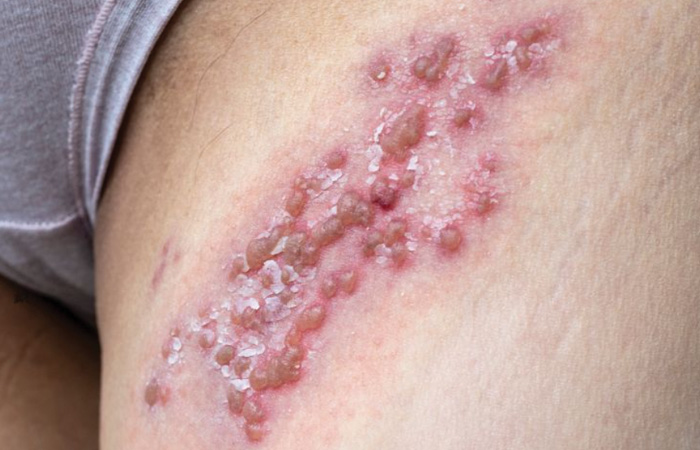Myths About Herpes That Keep You From Knowing the Truth
Why Genital Herpes Is So Common (And Still So Misunderstood)
Genital herpes affects more people than most would guess. According to the World Health Organization, over 500 million people globally are living with HSV-2, the primary virus responsible for genital herpes. If you include HSV-1, which traditionally causes oral herpes but can also be spread genitally through oral sex, that number climbs even higher. Despite these staggering figures, herpes remains one of the least talked about STIs, hidden behind embarrassment, fear, and outdated misconceptions.
The virus spreads through skin-to-skin contact, meaning you don’t need penetration or ejaculation to pass it on. Condoms help, but they’re not foolproof because herpes can live on areas condoms don’t cover. Many people don’t even know they have it. In fact, the majority of people with genital herpes never experience obvious symptoms. They go about their lives unaware, unintentionally spreading it to others, until a flare-up occurs or a routine test brings it to light.
And that’s where the stigma digs in. People associate herpes with promiscuity, with dirtiness, with recklessness. The truth? Herpes doesn’t discriminate. It affects people in monogamous relationships, people who’ve had a single partner, people who used protection, people who did everything “right.” The silence around it only makes the virus stronger. It thrives in shadows.
The goal of this article is to drag it into the light. To talk plainly about what it is, how it feels, how it spreads, and what you can actually do about it. Because the more you know, the more power you have over your health, and the less herpes has over you.

Why Knowing You Have Herpes Can Actually Help You
It might not feel like it at first, but getting a genital herpes diagnosis can be the start of taking control, not just of your sex life, but of your overall health and relationships. That might sound strange. Most people’s first reaction is fear, shame, or panic. But the truth is, knowing you have herpes is a lot better than not knowing. It puts you in a position to protect yourself and your partners. It stops the cycle of unintentional transmission. And most importantly, it gives you a clear path forward.
The benefits of awareness start with prevention. When someone knows they have herpes, they’re far more likely to avoid sexual contact during outbreaks, use protection consistently, and talk openly with partners. That conversation might feel awkward, but it can build trust. It can show that you’re informed and responsible. Ironically, some people find that talking about herpes leads to better communication about sex in general, something many relationships lack even without an STI in the picture.
Another major benefit is access to treatment. Herpes doesn’t go away, but antiviral medications can reduce the number of outbreaks, shorten the time they last, and lower your risk of passing the virus to someone else. For people who suffer from frequent flare-ups, this can be life-changing. Daily suppressive therapy can turn a chaotic, painful pattern into a quiet background issue.
Mental health also improves with information. The moment of diagnosis can feel like the world has collapsed, but as you learn more about the virus and meet others who live with it, the fear shrinks. You realize it’s manageable. You realize you’re not alone. Support groups, both online and in person, can make a huge difference in how you process the diagnosis and move forward.
Most importantly, understanding herpes means you can stop seeing yourself as damaged or dangerous. You are neither. You are someone with a virus that nearly a billion people carry. That doesn’t make you irresponsible, unclean, or undesirable. It makes you human.
Order Now $45.99 $49.00 Check Your STD Status in Minutes
Test at Home with Remedium
Genital Herpes Test Kit




The Hard Truth: What Makes Herpes So Difficult to Live With
Living with genital herpes isn’t just about managing a few blisters. It’s about navigating a whole new emotional and physical reality that doesn’t always play fair. While the virus itself can be controlled, the weight it carries goes far beyond medical symptoms. And for many, that burden starts long before the first outbreak is over.
Let’s start with the obvious: the pain. A first outbreak of herpes can be brutal. We’re talking about open sores in highly sensitive areas, burning urination, and flu-like symptoms that hit all at once. Some people can’t even sit down without wincing. And for those unlucky enough to get frequent flare-ups, this isn’t a one-time event. It becomes a recurring nightmare that strikes when you least expect it; during stressful times, illness, menstruation, or for no clear reason at all.
Then there’s the emotional toll. Shame is often worse than the virus itself. Herpes is loaded with social stigma, often treated like a scarlet letter. People worry they’ll never be wanted again, never date again, never have sex again. They imagine being judged, rejected, or laughed at. These fears aren’t always exaggerated. Some people do walk away. Some don’t understand. And the silence around herpes makes it worse because people rarely talk about it unless they have to.
Another risk lies in how herpes spreads. The virus can be passed on even when no symptoms are present, during a phase called asymptomatic shedding. You might feel fine, you might not see anything, but the virus could still be active on your skin. That unpredictability makes it feel like a betrayal of your body, of your trust in others, of your sense of safety. It forces you to rethink how you have sex and who you trust.
And then there’s the lifelong nature of it. Herpes doesn’t go away. It nestles into your nervous system and stays there. There’s no cure. For some, that thought alone can be overwhelming. You don’t get closure. You don’t get to walk away from it. You learn to manage it, live with it, make peace with it. But that takes time. And it’s not easy.
These are the realities. They don’t define you, but they do matter. And acknowledging them is the first step to taking back control.

What You Can Actually Do About It
If you’ve just been diagnosed with genital herpes, or if you’re worried you might have it, there’s one thing you need to know: this is not the end of your sex life, your dating life, or your self-worth. But it is the beginning of some changes. And those changes can actually make your life better.
First, take control of your health. That means getting tested if you haven’t already. At-home STD test kits are more accurate and accessible than ever. They let you check in with your body in private, without waiting rooms or side-eyes. But if your results come back positive, don’t stop there. You need a healthcare provider to confirm the diagnosis and talk you through treatment options.
Treatment isn’t just about dealing with outbreaks. Antiviral medications can lower your viral load, reduce the number of flare-ups, and drastically cut down your chances of passing the virus to someone else. Some people only take them during active outbreaks, while others take a daily dose to keep the virus at bay. Either way, it’s not just about managing symptoms, it’s about taking back control.
Then there’s the conversation. If you’re sexually active, this is non-negotiable: you have to tell your partners. Yes, it’s awkward. Yes, it might be terrifying. But people appreciate honesty more than you think. Some will walk away, but many won’t. And the ones who stay? They’re the ones who matter. You don’t have to do it on a first date, but before anything physical happens, they deserve to know.
Condoms are another tool in your arsenal. They don’t offer 100 percent protection against herpes, but they reduce the risk significantly, especially when paired with suppressive therapy. Avoiding sex during an outbreak is also essential. That’s when the virus is most active and the risk of transmission is highest.
Finally, find your people. Online forums, support groups, and communities for people with herpes can change everything. You’ll find advice, empathy, and maybe even a little humor. Talking to others who get it makes the whole thing feel less isolating.
You don’t have to do all this overnight. But you do have options. And more importantly, you have a future with love, sex, connection, and confidence still very much in it.
Order Now $75.00 $98.00 Check Your STD Status in Minutes
Test at Home with Remedium
Genital & Oral Herpes Test Kit




For all 2 tests
The Numbers Don’t Lie: Herpes Is Everywhere
If you think genital herpes is rare, you’re wrong. If you think it only happens to “certain types” of people, you’re even more wrong. Let’s talk numbers, because the statistics tell a story most people never hear, one that demolishes the myths and puts things into harsh, undeniable focus.
According to the World Health Organization, more than 500 million people worldwide are living with HSV-2, the virus most commonly responsible for genital herpes. And that’s just HSV-2. When you factor in HSV-1, which traditionally causes cold sores but is now a leading cause of genital infections thanks to oral sex, the number of people with some form of genital herpes shoots well past 1 billion. That’s not a niche problem. That’s a global reality.
In the United States alone, the Centers for Disease Control and Prevention (CDC) estimates that about 1 in 6 people aged 14 to 49 have genital herpes. That’s roughly 50 million Americans. But here’s the twist,most of them don’t know it. The virus is a master of disguise. It can live in the body without causing symptoms, silently shedding from the skin and infecting others. This is called asymptomatic viral shedding, and it’s one of the reasons herpes continues to spread even among people who think they’re “clean.”
Another unsettling fact: women are more likely than men to contract genital herpes from a male partner. The thin, delicate lining of the vaginal wall is more vulnerable to microscopic tears during sex, making it easier for the virus to enter. Even with protection, transmission can still occur.
The risk doesn’t stop at sexual partners. Pregnant women with herpes can pass the virus to their babies during childbirth, a condition known as neonatal herpes, which, while rare, can be fatal. This is why diagnosis, disclosure, and treatment matter. It’s not just about you. It’s about everyone you touch,literally and figuratively.
Still think herpes is something that only happens to other people? Statistically speaking, it’s already in your life. Whether it’s you, a partner, a friend, or someone you’ve kissed at a party, herpes is closer than you think. And that’s exactly why we need to talk about it.

What the Experts (and the Infected) Really Say
When it comes to genital herpes, cold facts can only go so far. What truly hits home are the voices of people who’ve lived it, studied it, and fought to change how we talk about it. Because behind every statistic is a story,and often, it’s one of resilience, not ruin.
Dr. Christine Johnston, an infectious disease expert at the University of Washington and a leading researcher on HSV, puts it plainly:
“Herpes is more common than people think, and less dangerous than they fear. The biggest problem isn’t the virus,it’s the stigma.”
That stigma is what Emily L. Depasse, a sexologist who lives with herpes, has spent her career dismantling. Diagnosed at 20, she speaks openly about the emotional chaos of those first few weeks,the shame, the silence, the Googling at 3 a.m.
“I thought my life was over. I thought no one would ever touch me again. But herpes didn’t end my life. It taught me how to advocate for it.”
Her story echoes that of Mark, a 34-year-old father of two who was diagnosed during a routine STD panel before trying for a third child.
“I was furious. I had no symptoms, no idea. But there it was, HSV-2. At first, I didn’t want to tell my wife. I felt disgusting. But when I did, she just said, ‘Okay. So what do we do now?’ That changed everything.”
Their stories aren’t rare. In forums, Reddit threads, and support groups, people share the same cycle,fear, grief, acceptance, empowerment. Some find partners who don’t care. Some find communities who lift them up. Many find purpose in helping others understand that herpes is not the end of desire, intimacy, or love.
Clinicians agree that one of the most critical shifts we can make is how we frame the conversation. Dr. Hunter Handsfield, a longtime herpes researcher, has repeatedly stated that herpes should be treated like a skin condition,not a moral failing.
“If herpes were on your elbow, no one would care. The reason it hurts so much is because we attach shame to sex.”
It’s a disease of perception as much as it is a virus. And the more we listen,to the people who live with it and the doctors who understand it,the more we can strip herpes of the power it doesn’t deserve.
Order Now $33.99 $49.00 Check Your STD Status in Minutes
Test at Home with Remedium
Oral Herpes Test Kit




How to Live with Herpes Without Letting It Run Your Life
A diagnosis feels huge at first. Life-changing, even. But the truth is, once the initial panic fades, herpes becomes part of the background. Like asthma, like migraines, like any chronic condition that flares and fades. You learn your rhythms. You learn your triggers. You adapt,and then you move on.
Daily life with genital herpes doesn’t need to be full of fear. Once you understand your body, you can take real, concrete steps to stay ahead of the virus and live your life on your terms.
For example, many people find it helpful to track their outbreaks. Stress, hormonal changes, illness, and even diet can influence when herpes strikes. Keeping a simple journal or phone note helps you spot patterns, so you can take better care of yourself before an outbreak hits. Some even use calendar alerts to remind them to take antivirals or vitamins that help with immune support.
Suppression therapy,taking antivirals like acyclovir or valacyclovir daily,is a game-changer for people with frequent outbreaks or those with partners who are uninfected. It reduces transmission risk by nearly 50 percent, even without a condom. If you’re in a committed relationship or actively dating, this isn’t just about your health. It’s about protecting someone else’s.
Open communication with sexual partners also becomes a habit. It’s not always easy, but once you’ve had “the talk” a few times, it gets less scary. You get to choose how much detail you share, but being upfront sets the tone for honesty, respect, and safety.
And don’t underestimate the value of mental health tools. Therapy, support groups, even simple mindfulness exercises can help with the shame and anxiety that tend to come with any STI diagnosis. Genital herpes might live in your body, but it doesn’t get to own your mind.
Herpes doesn’t have to define your life. It’s one part of your story,not the whole thing. And when you treat it like just another piece of health maintenance, it starts to lose its power.

What It’s Really Like: Stories from Behind the Stigma
It’s easy to talk about herpes in medical terms. But what sticks with people,what changes how they see themselves,are the stories. The raw, messy, real-life moments that don’t show up in pamphlets or public health websites.
Natalie, 27, was diagnosed after her first serious relationship ended.
“I blamed myself. I thought I must’ve done something wrong. I went through every partner I’d ever had, trying to trace it back like some detective. But the truth is, it didn’t matter. What mattered was that I was crying on the bathroom floor, feeling like I’d never be touched again. That night, I called a friend. Turns out, she had it too. She told me, ‘You’re not broken. You’re just shocked.’ And she was right.”
For Ty, a 41-year-old nurse who caught HSV-1 genitally from a casual hookup, the worst part wasn’t the outbreak. It was the silence that followed.
“The guy ghosted me. I had no idea what was happening to my body, and I was too embarrassed to ask anyone. I was in health care and still felt clueless. Eventually, I got diagnosed and started meds. I’ve only had one outbreak since. But that sense of isolation? It lasted way longer than the sores.”
There’s Ray, a 19-year-old college freshman who learned he had herpes from his first ever STD test.
“I wasn’t even sleeping with that many people. I thought I was being careful. When the results came back, I was like... herpes? Really? I thought that only happened to reckless people. Now I know it just happens. A lot. I’m still dating, still living. It hasn’t stopped anything. I just talk about it up front now, and if someone can’t handle it, I move on.”
These voices matter. Not because they’re rare, but because they’re common. More common than anyone wants to admit. And they remind us that a herpes diagnosis is not a death sentence for intimacy, romance, or dignity. It’s a chapter, not the whole book. And if you’re living it, you’re in good company.
Order Now $129.00 $343.00 Check Your STD Status in Minutes
Test at Home with Remedium
7-in-1 STD Test Kit




For all 7 tests
Herpes Myths That Refuse to Die
If genital herpes had better PR, the world would be a far less anxious place. But thanks to outdated sex ed, Hollywood punchlines, and plain old ignorance, a storm of myths still surrounds the virus,and those myths do real damage. Let’s break them down.
“You’ll always know if you have herpes.”
No, you won’t. In fact, most people with genital herpes don’t experience obvious symptoms. Some mistake their first outbreak for razor burn, an ingrown hair, or a yeast infection. Others never have symptoms at all. That’s what makes herpes so easy to spread. You can be completely unaware and still pass it on. The only way to know for sure is to get tested.
“Only promiscuous people get herpes.”
This one’s particularly cruel. Herpes doesn’t care how many people you’ve slept with. One partner is enough. You can get it from your first kiss or your first sexual encounter. Monogamous people get herpes. People in long-term relationships get herpes. Good people get herpes. The virus doesn’t discriminate. Only society does.
“Herpes is a dirty disease.”
No disease makes you dirty. Herpes is a virus, not a moral failing. It’s incredibly common, it’s manageable, and it’s not a reflection of who you are or how you live. The idea that herpes is something shameful comes from fear, not fact.
“You can’t have a normal sex life with herpes.”
Plenty of people with herpes have active, fulfilling sex lives. Open communication, condoms, and antiviral medication go a long way in protecting partners. And yes, people will still want you. Real intimacy starts with honesty, not a clean test result.
“You can’t have kids if you have herpes.”
Wrong again. Most people with herpes go on to have healthy pregnancies and healthy babies. The key is working with a doctor, especially if you have active outbreaks during delivery. In some cases, a C-section may be recommended, but the virus doesn’t automatically mean complications.

Genital Herpes FAQs: The Answers You’re Too Embarrassed to Google
1. Can you get genital herpes from oral sex?
Yes, absolutely. If someone has oral herpes (HSV-1) and performs oral sex, they can transmit the virus to your genitals. Many people don’t realize HSV-1 can be a cause of genital herpes, but it’s now one of the leading causes in young adults.
2. How long does a herpes outbreak last?
The first outbreak can last anywhere from two to four weeks. Recurrent outbreaks are usually shorter, often clearing up in about a week. With antiviral meds, healing time can be reduced even more.
3. Is it true you can have herpes and not know it?
Yes, and it’s incredibly common. The majority of people with herpes don’t know they have it because they’ve never had symptoms or mistook them for something else.
4. Can I still date if I have herpes?
Of course. You’ll have to talk about it with new partners, and some might walk away, but many won’t. Honesty and education go a long way. Lots of people with herpes have happy, healthy relationships.
5. What triggers herpes outbreaks?
Stress, illness, fatigue, friction during sex, sun exposure (for HSV-1), and menstruation are common triggers. Keeping your immune system strong and managing stress can help prevent flare-ups.
6. Can I pass herpes even if I don’t have symptoms?
Yes. It’s called asymptomatic shedding, and it’s one of the trickiest parts of managing herpes. That’s why it’s important to use protection and consider antiviral meds if you’re sexually active.
7. Do condoms fully protect against herpes?
They help, but they’re not foolproof. Herpes can be transmitted through skin-to-skin contact in areas not covered by a condom. That said, condoms plus antiviral meds significantly reduce the risk.
8. Is there a cure for herpes?
No cure yet, but there are effective treatments. Antiviral medications like acyclovir, valacyclovir, or famciclovir can manage symptoms, reduce outbreaks, and lower transmission risk.
9. Should I get tested even if I don’t have symptoms?
If you’ve had unprotected sex or a partner who’s tested positive, yes. Standard STI panels don’t always include herpes, so you may need to ask for it specifically.
10. Can herpes be fatal?
In healthy adults, no. But in rare cases, herpes can be dangerous for newborns during delivery (neonatal herpes) or for immunocompromised individuals. That’s why diagnosis and treatment matter.
Order Now $119.00 $294.00 Check Your STD Status in Minutes
Test at Home with Remedium
6-in-1 STD Test Kit




For all 6 tests
The Truth About Genital Herpes Deserves to Be Heard
You’ve made it this far, which already puts you ahead of most people. You didn’t look away. You didn’t let the discomfort stop you from learning. And that’s what makes all the difference, because the more we talk about herpes, the less power it has to ruin lives quietly.
Genital herpes is common. Manageable. Often invisible. It does not mean you’re reckless, dirty, or broken. It means you’re human in a world where viruses exist. The real danger is not the virus, it’s the silence. It’s the shame that keeps people from getting tested, from telling their partners, from taking control.
But you have the tools now. You know what it looks like, how it spreads, what it feels like to live with it, and how to protect yourself and others. You know how to tell fact from fear. And you know that a diagnosis doesn’t end anything, it just begins a different kind of awareness.
If you suspect you may have genital herpes, don’t wait.
Sources
1. Herpes – STI Treatment Guidelines – CDC
3. Overview: Genital Herpes – InformedHealth.org (Merk Verlag)










